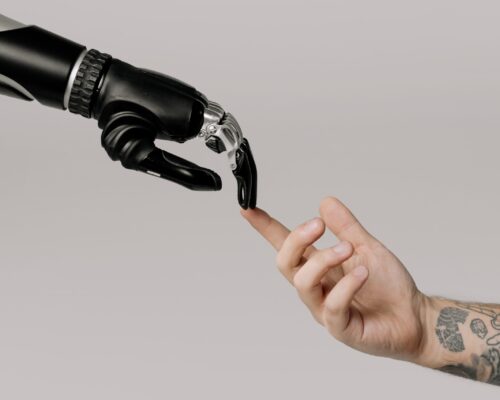Are you concerned AI will replace you one day? You’re not alone.
In fact, according to a CNBC SurveyMonkey Workforce survey, 60% of employees who regularly use AI are worried about its impact on their jobs.
Artificial intelligence is advancing at breakneck speed, and it’s only natural to worry about what this means for your job. But before you hit the panic button, let’s explore how AI is actually reshaping the job market and the broader economy.
How is AI Transforming the Job Market?
Artificial intelligence and automation are shaking things up, and it’s true. AI might take over some repetitive tasks, like scheduling social media posts or sifting through resumes. But here’s the exciting part: the AI revolution is also creating new job opportunities that didn’t exist before.
Consider the rise of roles like “prompt engineer” and “AI product manager”. These are high-paying positions that have emerged thanks to AI development. According to the 2024 Work Trend Index Annual Report by Microsoft and LinkedIn, nearly 75% of knowledge workers already use generative AI models on the job. This means familiarity with AI software is becoming a must-have skill.
And guess what? The same report found that two-thirds of leaders say they wouldn’t hire someone without AI skills. So, if you’re worried about artificial intelligence taking your job, now’s the perfect time to start learning these new tools.
What Economic Growth Can AI Spur?
AI isn’t just changing jobs. It’s set to have an enormous global economic impact. McKinsey estimates that generative AI could add between $2.6 trillion and $4.4 trillion in value to the global economy across various industries, from banking to healthcare.
AI technology is addressing low productivity growth, making businesses more efficient and competitive. For example, in the past year, AI adoption has helped companies streamline operations and scale up faster than ever before. Imagine analysing huge data sets in minutes or crafting sales emails at lightning speed. AI is making this possible, leading to incredible productivity gains.
Are There Ethical Concerns with AI Automation?
Yes, AI’s rise does come with ethical concerns, especially around job displacement and inequality. While AI models can take over routine tasks, freeing up humans for more strategic and creative work, there’s a real need to support those displaced by these changes. Microsoft and LinkedIn found that only 39% of employees say their employers provide AI training, which means a significant gap needs to be addressed.
Policies that promote reskilling and upskilling are crucial. It’s all about balancing AI’s economic benefits with a fair transition for workers. This ensures everyone can benefit from AI’s potential, not just a select few.
How Have Industries Adopted AI?
Industries are adopting AI at different paces, with some leading the way. Healthcare, for instance, is seeing AI-driven breakthroughs in drug discovery and medical imaging. AI is helping researchers identify new drug compounds faster and more accurately, revolutionising the field.
In retail, AI applications optimise everything from inventory management to personalised marketing. For example, Zendesk’s AI-driven tools help centralise customer service management by bringing every aspect—tickets, feedback, queries, and team communications—into a single, intuitive dashboard. This holistic view allows teams to help customers quickly and effectively, with a full view of the customer’s recent purchases, shopping behaviour and more.
Additionally, Zendesk’s automated ticket workflows and tailored support tracking allow teams to prioritise and collaborate on complex issues, significantly boosting customer satisfaction.
What Predictions Exist for AI’s Economic Future?
The future of AI in the economy looks bright—but busy. Experts predict a significant increase in AI-related jobs over the next few years. A Salesforce-sponsored report anticipates 11.6 million new jobs in the AI ecosystem between 2022 and 2028. Roles like data architects, AI ethicists, and AI solutions architects are expected to be in high demand.
Despite concerns that AI technologies might eliminate jobs, they also create new opportunities and make work more engaging by taking over mundane tasks. The bigger impact? More strategic, creative, and fulfilling roles for us.
How Should Education Evolve with AI?
Education systems need to evolve to prepare the workforce for an AI-driven economy. This means emphasising STEM (science, technology, engineering, and mathematics) education and fostering critical thinking and problem-solving skills. Online learning platforms make accessing AI training and building relevant skills easier than ever.
Education systems can ensure workers are equipped to thrive in an AI-driven world by focusing on new skill sets required for emerging job categories. Embracing lifelong learning is crucial to staying competitive in the job market.
AI is Here to Stay, and We Must Adapt
AI and automation are transforming the global economy, offering unprecedented productivity growth and economic benefits. While this transformation comes with challenges, such as ethical concerns and the need for workforce adaptation, it also presents incredible opportunities.
By understanding AI’s potential benefits and risks, we can confidently navigate this revolution and harness its power for a prosperous future. So, why not start exploring AI tools and upskilling today? You never know where it could lead.










